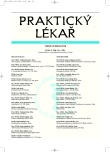-
Medical journals
- Career
Risk of malnutrition and nutritional support in Alzheimer disease
Authors: L. Sobotka 1; Navrátilovám. 2; Jiří Jarkovský 3; D. Solichová 1; R. Hyšpler 1; Zadák Z. Češková E. 1 2
Authors‘ workplace: Klinika gerontologická a metabolická Univerzita Karlova v Praze, Lékařská fakulta Hradec Králové. Přednosta: Prof. MUDr. Luboš Sobotka, CSc. 1; Psychiatrická klinika Lékařská fakulta, Masarykova univerzita, Brno Přednostka: Prof. MUDr. Eva Češková, CSc. 2; Institut biostatistiky a analýz Lékařské fakulty Masarykova univerzita, Brno Přednosta: Doc. RNDr. Ladislav Dušek, CSc. 3
Published in: Prakt. Lék. 2007; 87(2): 97-102
Category: Of different specialties
Overview
The aim of our study
was to describe the nutritional status in patients with Alzheimer’s disease and in those with dementia of vascular aetiology and to assess the effect of nutritional support on mortality and mental functions in these subjects. One hundred and sixty-five residents (100 Alzheimer’s disease and 65 vascular dementia) living in 7 institutions throughout the Czech Republic were studied over a two-year-period. Voluntary food intake was measured during the first year, following which; the patients with Alzheimer’s disease were randomised into two groups. The study group received 600 kcal supplements (Nutridrink Nutricia) to their regular diet whereas the control group continued on the standard diet. Nutritional parameters using the Mini Nutritional Assessment (MNA), body weight, and mental state Mini Mental State Examination (MMSE) were monitored every third month and spontaneous food intake was measured every second month of the study period.
The nutritional status (MNA) was significantly worse in patients with Alzheimer’s disease than in patients with vascular dementia. This parameter correlated with body mass index and spontaneous food intake. Nutritional support significantly slowed down the deterioration of the mental functions of the Alzheimer’s disease patients.
It is concluded that dietary counselling and nutritional support in patients with Alzheimer’s disease is clinically important and reduces the impairment of mental functions.Key words:
Alzheimer’s disease, nutritional support, mental functions, undernutrition.
Labels
General practitioner for children and adolescents General practitioner for adults
Article was published inGeneral Practitioner

2007 Issue 2-
All articles in this issue
- The legacy of I. F. Semmelweis; key milestones in the development of hospital hygiene and current challenges.
- Insulin pump therapy for diabetic patients
- Three hundreds pancreas transplantations in the Institute of Clinical and Experimental Medicine in Prague
- Symptomatic diabetic neuropathy: irreversible nerve damage?
- Catheter ablation for atrial fibrillation in 2007
- Diabetic foot syndrome
- Risk of malnutrition and nutritional support in Alzheimer disease
- How well do patients follow their doctor’s advice?
- A manual for the „Our class does not smoke“ programme
- Two cases of aortic valve endocarditis after the floods in 2002
- Symptoms of paraneoplastic encephalopathy as the first clinical sign of Hodgkin’s lymphoma. A case study
- Active search for prostate cancer by PSA testing in GP surgery
- General Practitioner
- Journal archive
- Current issue
- Online only
- About the journal
Most read in this issue- Risk of malnutrition and nutritional support in Alzheimer disease
- Active search for prostate cancer by PSA testing in GP surgery
- The legacy of I. F. Semmelweis; key milestones in the development of hospital hygiene and current challenges.
- Symptomatic diabetic neuropathy: irreversible nerve damage?
Login#ADS_BOTTOM_SCRIPTS#Forgotten passwordEnter the email address that you registered with. We will send you instructions on how to set a new password.
- Career

